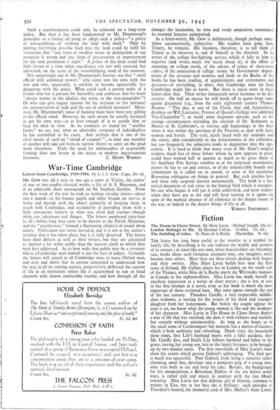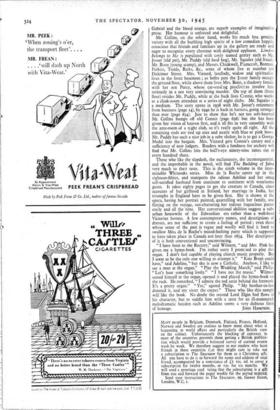Fiction
The Building of Jalna. By Mazo de la Roche. (Macmillan. 9s. 6d.) •
THE house has long been useful to the novelist as a Symbol for family life, by describing it he can indicate the wealth and position of its owners; in times like our own, when householders are becoming rare, books about such fortunate creatures may, one imagines' easily become best sellers. Here then are three novels dealing with houses and their owners. Miss Mary Lavin builds hers near the East coast of Ireland, Mr. Collins places his in London on the south side of the Thames, while Miss de la Roche-erects the Whiteoaks mansion in Canada in the eighteen-fifties. Miss Lavin has made herself an excellent reputation as a writer of short stories she is less at ease in her first attempt at a novel, even so her boa is much the most important of those reviewed here. Her story opens towards the end of the last century. Theodore Coniffe, a very respectable middle- class widower, is waiting for the return of his third and youngest daughter from her honeymoon. But before the couple appear the tone is set, we know what the young woman is like and the weakness of her character. Miss Lavin in The House in Clewe Street depicts a way of life that has vanished, she does it with richness and warmth, but entirely without sentimentality. As long as she keeps us in the small town of Castlerampart her material has a matter-of-factness which is both authentic and refreshing. Death visits the household three times, first Lily's husband meets with a fatal accident, then Mr. Coniffe dies, and finally Lily follows husband and father to the grave, leaving her young son, heir to the family fortunes, to be brought up by two maiden aunts. The first two-thirds of Miss Lavin's book show the events which govern Gabriel's upbringing. The final part is much less successful. Poor Gabriel, from being a sensitive rather charming small boy, develops into a pompous prig of a young man, who tries both to eat and keep his cake. Besides, the background for his emancipation, a Bohemian Dublin of the era before world wars, is rather stale and musty in contrast with the tiny Meath township. Miss Lavin has that dubious gift of blarney, common to writers in Eire, but at her best she is brilliant : such episodes as Theodore's funeral, the memorial card of Mrs. Molloy's Aunt Lottie.
Gabriel and the blood orange, are superb examples of imaginative prose. Her humour is unforced and delightful
Mr. Collins on the other hand, works his much less genuine variety with an the burbling high spirits of a low comedian happil% conscious that friends and familiars up in the gallery are ready and eager to recognise every chestnut with delighted applause. London Belongs to Me is populated with coyly named gentry such as Mr. Josser (old pet), Mr. Puddy (old food hog), Mr. Squales (old fraud), Mr. Boon (young scamp), and Messrs. Chinkwell, Plumcxoft, Beeman, Perkiss, Todds, Barks, &c., some of whom live at number ten Dulcimer Street. Mrs. Vizzard, landlady, widow and spiritualist. lives in the front basement ; as befits pets the Josser family occupy the ground floor, while above them lives Mrs. Boon, a shadowy female with her son Percy, whose car-stealing proclivities involve him seriously in a not very convincing murder. On top of /hem (front floor) resides Mr. Puddy, while at the back lives Connie, who works as a cloak-room attendant at a series of night clubs. Mr. Squales is a medium. The story opens in 1938 with Mr. Josser's retirement from business (page 4), by i94o he is back in harness, going stronger than ever (page 634). Just to show that he's not too soft-hearted Mr. Collins bumps off old Connie (page 636) but she has been given her vision of heaven first, and it all fits in very smoothly with the ante-room of a night club, so it's really quite all right. All the remaining ends are tied up nice and neatly with blue or pink bows. Mr. Puddy has such a nice job in a tube shelter, he is to get a George Medal into the bargain. Mrs. Vizzard gets Connie's canary and a sufficiency of new lodgers. Readers with a fondness for archery will find that Mr. Collins hits the bull's-eye ninety-nine times out of every hundred shots.
Those who like the slapdash, the exclamatory, the inconsequential, and the improbable in the novel, will find The Building of jalna very much to their taste. This is the ninth volume in the inter- minable Whiteoaks series. Miss de la Roche ' opens up in the eighteen-fifties, and transports the odious Adeline and her smug self-satisfied husband from continent to continent with wearisome gusto. It takes eighty pages to get the creature to Canada, since accounts of her girlhood in Ireland, her marriage in India, her triumphs in England have to be given first. She is shown at the opera, having her portrait painted, quarrelling with her family, and flirting on the voyage, out-chattering her tedious loquacious parrot easily and all the time. Her conversational abilities suggest a sub- urban housewife of the Edwardian era rather than a well-bred Victorian hostess. A few contemporary names, and descriptions of dresses, are not sufficient to create a feeling of period ; even those whose sense of the past is vague and woolly will find it hard to swallow Miss de la Roche's mixed-bathing party which is supposed to have taken place in Canada not later than 1854. Her description of it is both conventional and unconvincing.
" I have been to the Rectory," said Wilmott, "and Mrs Pink has given me a hymn-book. I'm rather sorry I prom:sed to play this organ. I don't feel capable of playing church music properly. But I seem to be the only one willing to attempt it." "Kate Brent could have," said Adeline, but she is now a Catholic. Anyhow, I like to see a man at the organ." "Play the Wedding March," said Philip. 'Let's hear something lively." "I have not the music." Wihnott seated himself at the organ, opened it and placed the hymn-book on the rack. He remarked, "I admire the red satin behind the fretwork. It's a pretty organ." " Yes " agreed Philip. "My brother-in-law donated it, and my sister the carpet." Those who like this sample will like the book. No doubt the second Lord Elgin had flaws in his character, but to saddle him with a taste for an ill-mannered, melodramatic hoyden such as Adeline seems a very dubious farm































 Previous page
Previous page